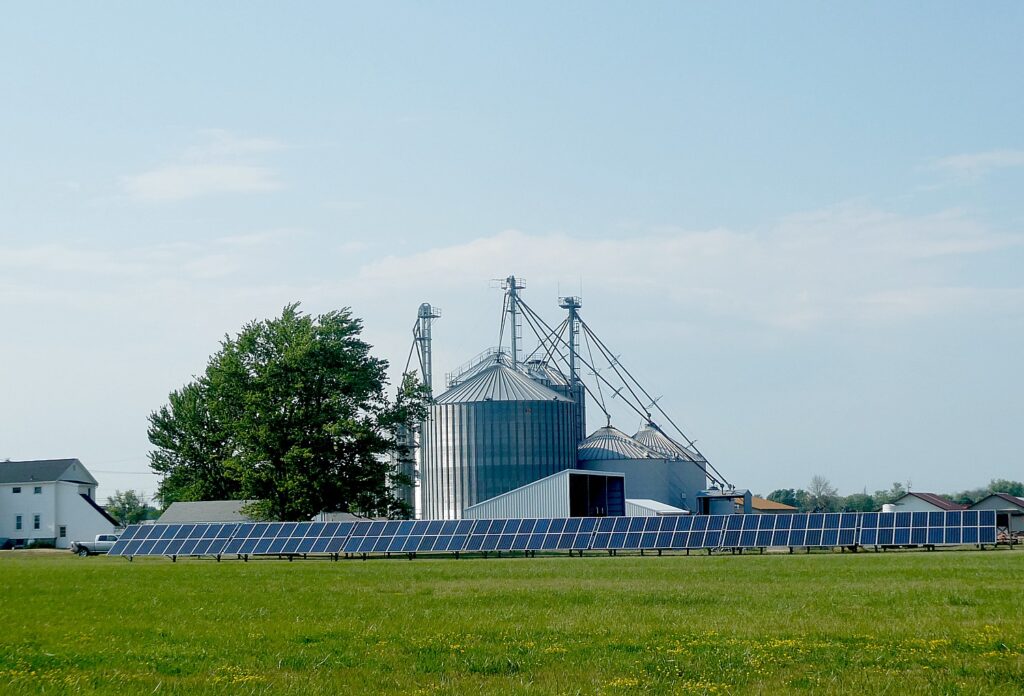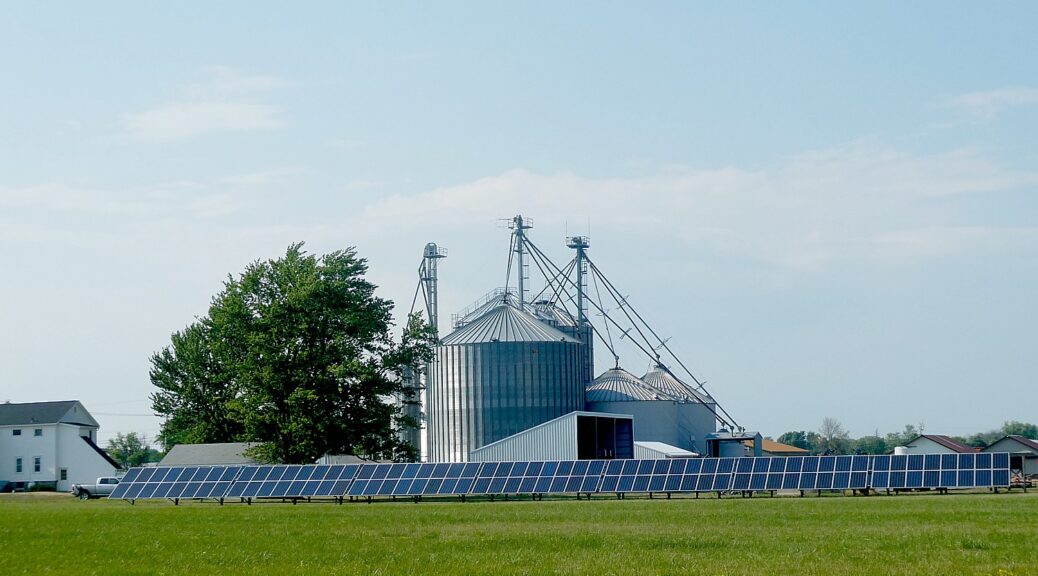Historic Actions Include Authorizing Defense Production Act to Lower Energy Costs, Strengthen Power Grid, and Create Good-Paying Jobs

I find it infuriating that the “news” is completely taken over by the latest travesties by Trump, Putin and Supreme Court, fueling anger and cynicism among Democrats and Progressives who may well take their anger out at the polls and simply not vote – that, I would remind you, is how we got Trump and this Christo Fascist Supreme Court. Biden Administration not doing anything on climate change? Inflation? Health care? Nonsense. This administration has been incredibly productive – finding real solutions, not bandaids, rhetoric and hype, that have at their foundation a sense of equity, sustainability and social justice. Want to solve inflation? Not by the Keystone Pipeline or overturning coal plant rules, but investing in EV infrastructure, as Biden wants to do. But you wouldn’t know it from the media, social or otherwise. It is our practice, then, to publish first-hand accounts from the White House, federal agencies and officials. –Karen Rubin/news-photos-features.com
Today’s clean energy technologies are a critical part of the arsenal we must harness to lower energy costs for families, reduce risks to our power grid, and tackle the urgent crisis of a changing climate. From day one, President Biden has mobilized investment in these critical technologies. Thanks to his clean energy and climate agenda, last year marked the largest deployment of solar, wind, and batteries in United States history, and our nation is now a magnet for investment in clean energy manufacturing.
Since President Biden took office, the private sector has committed over $100 billion in new private capital to make electric vehicles and batteries in the United States. We have made historic investments in clean hydrogen, nuclear, and other cutting-edge technologies. And companies are investing billions more to grow a new domestic offshore wind industry.
We are also now on track to triple domestic solar manufacturing capacity by 2024. The expansions to domestic solar manufacturing capacity announced since President Biden took office will grow the current base capacity of 7.5 gigawatts by an additional 15 gigawatts. This would total 22.5 gigawatts by the end of his first term – enough to enable more than 3.3 million homes to switch to clean solar energy each year.
While President Biden continues pushing Congress to pass clean energy investments and tax cuts, he is taking bold action to rapidly build on this progress and create a bridge to this American-made clean energy future. Today, President Biden is taking action to:
- Authorize use of the Defense Production Act (DPA) to accelerate domestic production of clean energy technologies, including solar panel parts;
- Put the full power of federal procurement to work spurring additional domestic solar manufacturing capacity by directing the development of master supply agreements, including “super preference” status; and
- Create a 24-month bridge as domestic manufacturing rapidly scales up to ensure the reliable supply of components that U.S. solar deployers need to construct clean energy projects and an electric grid for the 21st century, while reinforcing the integrity of our trade laws and processes.
Together, these actions will spur domestic manufacturing, construction projects, and good-paying jobs – all while cutting energy costs for families, strengthening our grid, and tackling climate change and environmental injustice. With a stronger clean energy arsenal, the United States can be an even stronger partner to our allies, especially in the face of Putin’s war in Ukraine.
The stakes could not be higher. That is why President Biden also continues to urge Congress to quickly pass tax cuts and additional investments that advance U.S. clean energy manufacturing and deployment. Failing to take these actions would deny consumers access to cost-cutting clean energy options, add risks to our power grid, and stall domestic clean energy construction projects that are critical to tackling the climate crisis. At the same time, President Biden will keep using his executive authority to take bold action to build an American-made clean energy future.
INVOKING THE DEFENSE PRODUCTION ACT FOR CLEAN ENERGY
Today, President Biden is authorizing the use of the Defense Production Act (DPA) to accelerate domestic production of clean energy technologies – unlocking new powers to meet this moment. Specifically, the President is authorizing the Department of Energy to use the DPA to rapidly expand American manufacturing of five critical clean energy technologies:
- Solar panel parts like photovoltaic modules and module components;
- Building insulation;
- Heat pumps, which heat and cool buildings super efficiently;
- Equipment for making and using clean electricity-generated fuels, including electrolyzers, fuel cells, and related platinum group metals; and
- Critical power grid infrastructure like transformers.
In deploying the DPA, the Biden-Harris Administration will strongly encourage the use of strong labor standards, including project labor agreements and community benefits agreements that offer wages at or above the prevailing rate and include local hire provisions. The Administration also will strongly encourage projects with environmental justice outcomes that empower the clean energy transition in low-income communities historically overburdened by legacy pollution.
Following this announcement, the White House and the Department of Energy will convene relevant industry, labor, environmental justice, and other key stakeholders as we maximize the impact of the DPA tools made available by President Biden’s actions and strengthen domestic clean energy manufacturing.
BOOSTING MADE-IN-AMERICA CLEAN ENERGY WITH FEDERAL PROCUREMENT
President Biden is also putting the full power of federal procurement to work spurring additional domestic solar manufacturing capacity. Today, the President directed the development of two innovative tools to accelerate Made-in-America clean energy:
- Master Supply Agreements for domestically manufactured solar systems to increase the speed and efficiency with which domestic clean electricity providers can sell their products to the U.S. Government; and
- So-called “Super Preferences” to apply domestic content standards for federal procurement of solar systems, including domestically manufactured solar photovoltaic components, consistent with the Buy American Act.
These federal procurement measures can stimulate demand for up to a gigawatt of domestically produced solar modules in the near term, and up to 10 gigawatts over the next decade from U.S. government demand alone. To further increase the impact of these actions, the Administration will also partner with state and local governments and municipal utilities in these innovative arrangements – increasing the potential market impact over the next decade to as much as over 100 gigawatts. These procurement actions will provide a significant demand anchor for a revitalized domestic solar manufacturing industry.
SUPPORT FOR U.S. GRID-STRENGTHENING, CLEAN ENERGY CONSTRUCTION PROJECTS
Because of private investor confidence in President Biden’s leadership and our national commitment to a clean energy future, the United States is now on track to triple its solar manufacturing capacity by 2024. The expansions to domestic solar manufacturing capacity announced since the President took office will grow the current 7.5 gigawatts of capacity by an additional 15 gigawatts of capacity, for a total of 22.5 gigawatts by the end of his first term – enough to enable more than 3.3 million homes to switch to clean solar energy every year. To rapidly build on this progress and create a bridge to this American-made clean energy future, we need to boost short-term solar panel supply to support construction projects in the United States right now. This is because grid operators around the country are relying on planned solar projects to come online to ensure there is sufficient power to meet demand, and to ensure we can continue to deploy solar at the rates needed to keep us on track to meet the President’s climate goals.
Today, President Biden is using his powers to create a 24-month bridge for certain solar imports while reinforcing the integrity of our trade laws and processes. Specifically, the President is:
- Temporarily facilitating U.S. solar deployers’ ability to source solar modules and cells from Cambodia, Malaysia, Thailand, and Vietnam by providing that those components can be imported free of certain duties for 24 months in order to ensure the U.S. has access to a sufficient supply of solar modules to meet electricity generation needs while domestic manufacturing scales up; and
- Reinforcing his commitment to safeguarding the integrity and independence of all ongoing trade investigations by career officials at the Department of Commerce and recognizing the vital role these processes play in strengthening our economy.
ADDITIONAL STEPS TO CUT COSTS, SUPPORT GOOD-PAYING JOBS, AND ADVANCE ENVIRONMENTAL JUSTICE
Today’s actions build on this Administration’s existing initiatives to grow domestic clean energy innovation and manufacturing and to lower energy costs for Americans, including:
- Permitting More Clean Energy on Public Lands. As part of the Biden-Harris Permitting Action Plan, a new five-agency collaboration is expediting reviews of clean energy projects on public lands through the Department of the Interior, helping us race ahead toward permitting at least 25 gigawatts by 2025 – enough to power around five million homes. These actions have already increased clean energy permitting activities by 35 percent, including major solar project approvals and leases. We have also launched five new Renewable Energy Coordination Offices and reduced rents and fees by more than 50 percent for solar and wind projects on public lands.
- Boosting Community-Based Clean Energy in Cities and Rural Areas. The Biden-Harris Administration is helping 17 local communities remove red tape with the SolarAPP+ online tool to enable same-day approvals for residential solar installation permits, and an additional 400 interested communities are in the pipeline. The National Climate Task Force launched new initiatives on increasing deployment of Distributed Energy Resources, including rooftop solar, with a focus on bringing the benefits of these projects to underserved communities. The United States Department of Agriculture provided the largest-ever investment in rural renewable energy last year. In addition, the Department of Energy and the Department of Health and Human Services are partnering to develop and pilot a digital platform that will connect customers who are eligible for the Low Income Home Energy Assistance Program with community solar subscriptions, to further reduce customer energy costs. Likewise, the U.S. Department of Housing and Urban Development is working with municipalities to enable residents of affordable housing to directly benefit from low-cost community solar power without seeing a rent increase or adjustment to their utility allowance.
- Supporting a Diverse Solar Workforce with Good-Paying Jobs, including pathways to stable careers with the free and fair choice to join a union. Solar industry jobs consistently rank among the top fastest-growing in the nation, and many require only a high school education or GED. The Economic Development Administration recently awarded funding to support solar employment training in tribal and coal-impacted communities. In addition, the Department of Energy has issued a Request for Information and hosted six workshops to determine common goals and needs from stakeholders, including industry, unions, and training organizations. DOE will continue to explore these issues, including by providing funding, new collaborations with industry, other federal agencies, and state-based job boards to develop equitable worker-centric training and education programs, work-based learning opportunities, and support services such as career counseling, mentorship, and job readiness programs.
- Developing Clean Energy Domestic Manufacturing for Export and Building Capacity in Allied Nations. The Export-Import Bank of the United States (EXIM) Make More in America Initiative, approved by the EXIM board in April, will prioritize investments to expand clean energy manufacturing. The U.S. International Development Finance Corporation supports building resilient clean energy manufacturing supply chains in allied nations around the world, reducing global dependence on China.
- Investing in Clean Energy for Resilience in Puerto Rico: The Biden-Harris Administration joined forces with the Commonwealth of Puerto Rico to advance dozens of solar energy projects that will enable Puerto Rico to meet its target of 100% renewable electricity, while improving power sector resilience and increasing access to more affordable energy and cleaner air.

